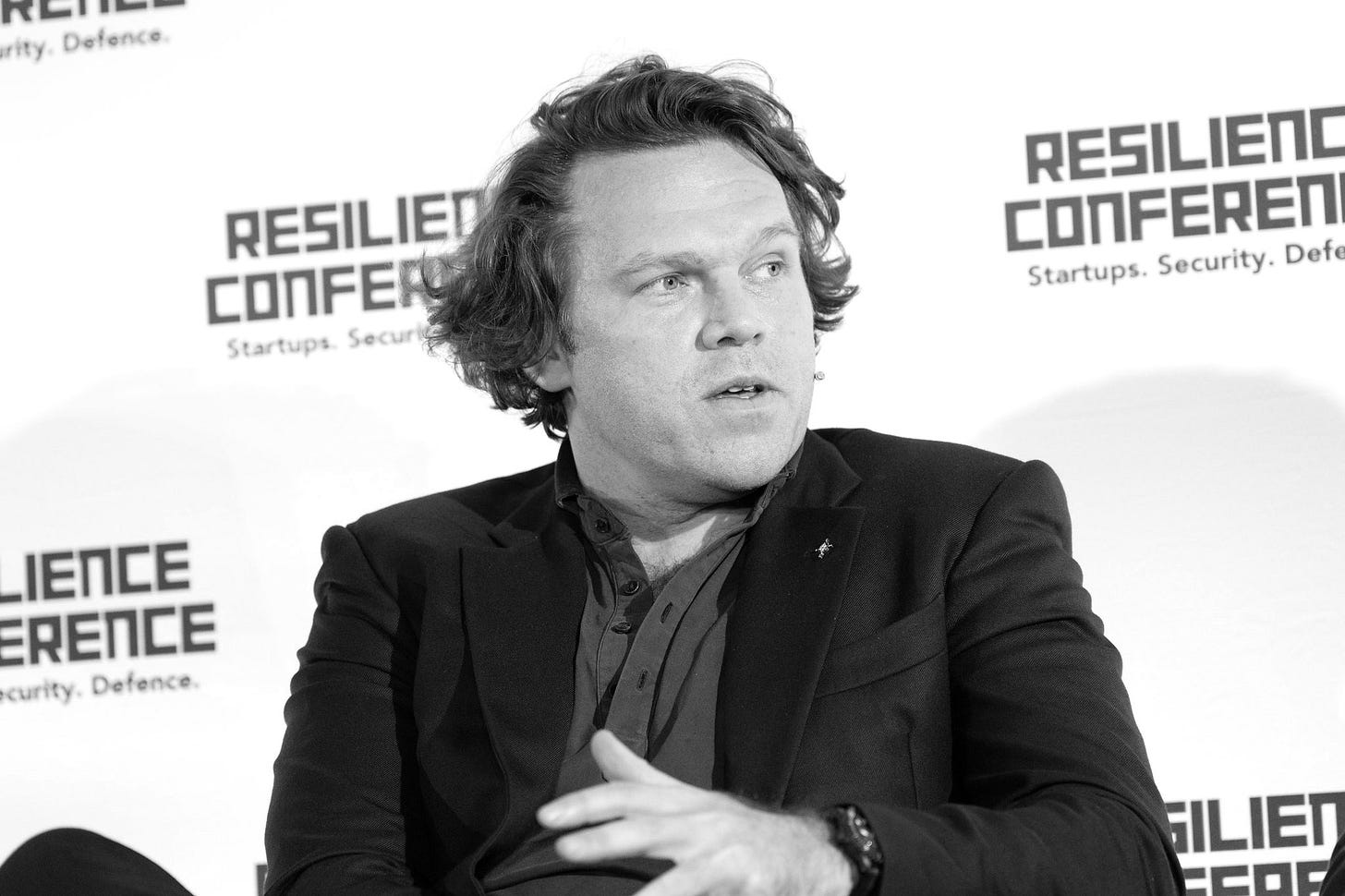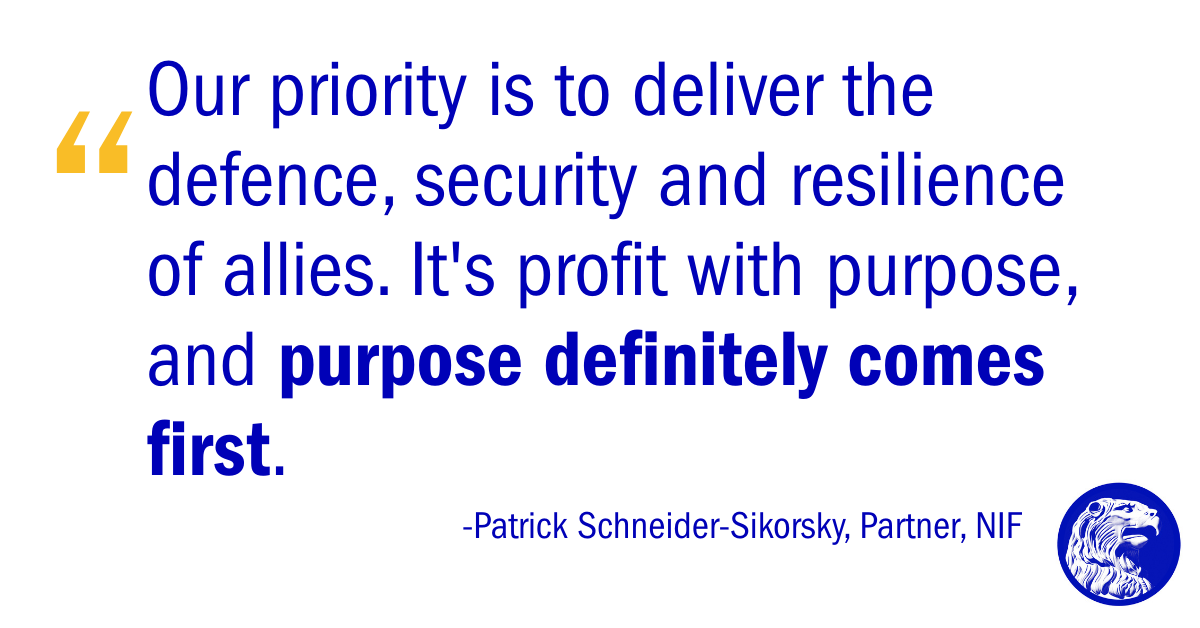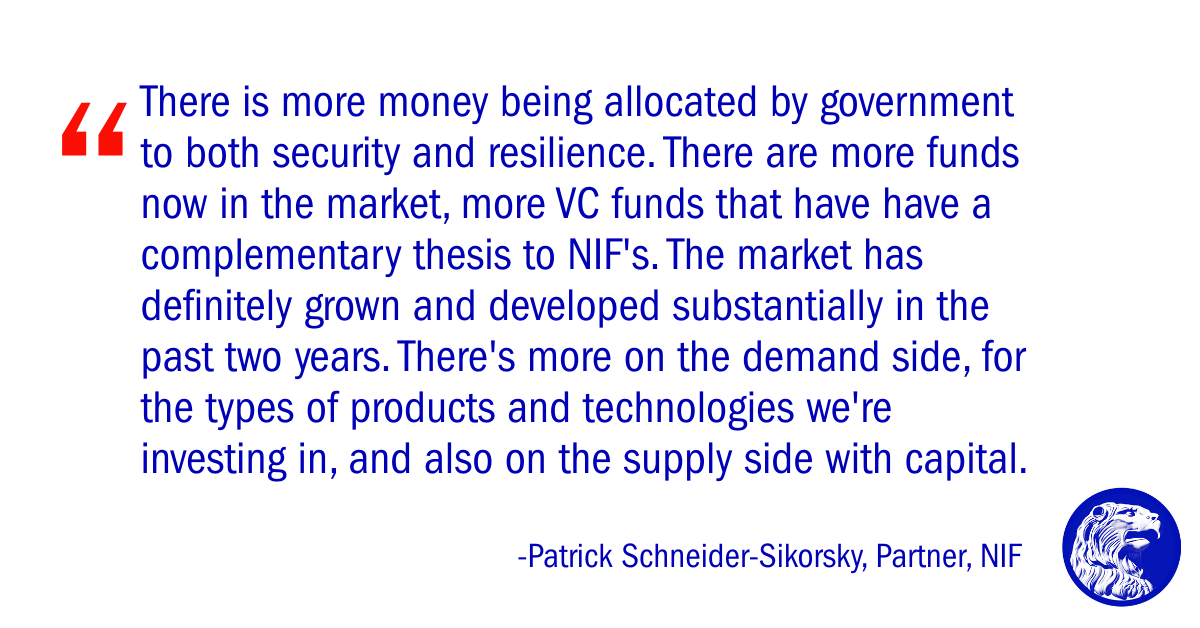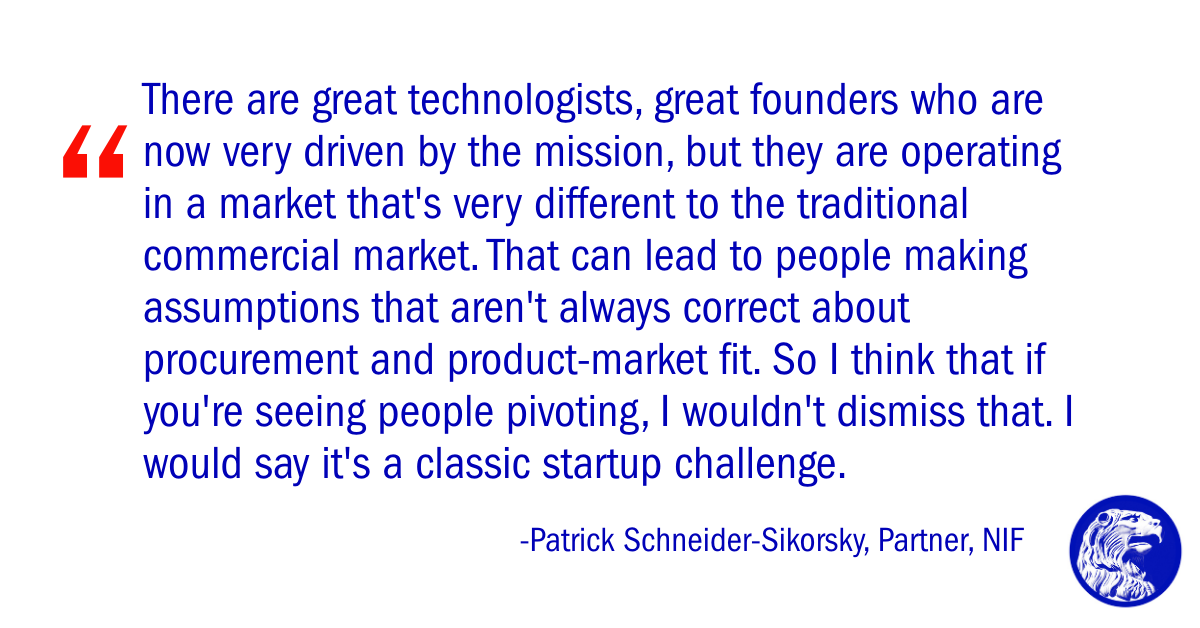'We're literally in an arms race' says NIF's Patrick Schneider-Sikorsky
The €1b NATO Innovation Fund has a clear mission but a complicated execution. In a wide-ranging interview with its most senior partner, we talk about the challenges and opportunities ahead.
In 2023, NATO jumped with two feet into the world of tech with the launch of the NATO Innovation Fund (NIF). It’s the world’s first multi-sovereign venture capital fund, and armed with €1 billion, its task over the next decade is to make early-stage investments in tech startups building products to secure and defend the NATO alliance.
In 2025, that imperative has proved especially relevant in Europe, where the majority of NATO is focused — most prominently because of the war in Ukraine. The country’s forces and its allies have rallied around, and relied on, advances in a new generation of tools and weaponry powered by AI and other technology to fight back against Russia — in no small part because the latter continues to encroach on Ukrainian territory and develop its own technology to aid in that effort.
“We’re literally in an arms race,” Patrick Schneider-Sikorsky, a Partner at NIF, said of the scramble to build systems that can out-tech the opponent’s.
But the mission of NIF is clear not just because of Ukraine.
Wider geopolitical and economic tides — the US taking a more self-reliant stance on foreign entanglements; countries wanting to boost domestic production — have driven nations to build strategies to update and improve their defence and other critical infrastructure.
Thousands of startups are building deep tech, defence tech and other products to fill that need across various vectors. Primes are taking notice and engaging with those startups to boost their own technology profiles, and billions of dollars have been coming in from the world of venture capital to fuel that engine. NATO itself had already established an accelerator, DIANA, to help lay the groundwork.
NIF’s mission may be clear, but execution has been a little more complicated.
NIF has seen significant turnover in leadership, with Schneider-Sikorsky the only remaining partner from the founding team. Reports have called into question how the fund is managed, specifically whether there are conflicts of interest between it and Klaus Hommels, NIF’s chairman but also the head and founder of the VC firm Lakestar.
There is also the LP make-up of NIF. It has never been a direct overlap with NATO itself, and of the 32 members of the NATO alliance, only 24 are LPs in NIF. Notably among those missing are the US and Canada. Canada has not ruled out participating (although it has yet to do anything); and while two US congressmen in November 2024 sponsored a bill proposing to put $200 million into NIF itself, nothing has happened with the bill since then (and now, the possibility US sinking hundreds of millions of dollars into a NATO project seems very remote). It not only begs questions of why these countries are not a part of it and whether they ever will be, but what their absence signifies.
Last but not least, there is the disbursement of the fund itself. €1 billion is a massive sum to get through even within a 10-year timescale, not least because NIF was set up for smaller, earlier stage investments alongside participating in other funds. NIF says it is on track regardless, but outsiders can only conjecture around more granular detail of progress: NIF lists its portfolio, but we don’t know how much it has deployed to date into these startups.
But it’s important to provide some counterbalance here.
Funds and investment firms can be a little like startups, with growing pains and time needed to for teams to settle in when they are new. NIF has categorically dismissed implications of conflict of interest, citing a charter it says it follows. The lack of investment from certain countries, meanwhile, is offset by robust venture ecosystems in North America that generally outpace those of Europe, spanning private firms, family offices and government-backed venture activities. Not having involvement from outsized alliance members could ultimately mean less influence from them, too.
Sikorsky is a fitting last person left standing from the original lineup at NIF.
“Some people refer to me as Wolverine,” he joked. With his Polish background, you might even say the spectre of Russia is in his genes. Yet mixing geopolitics with business and technology is something he has cultivated, too.
Studying Russian language and literature at Oxford, Sikorsky went on to get a masters in foreign policy in London and then another one in management at MIT. Jobs prior to NIF have included roles in policy and political risk, as he describes it, as well as early stage deep-tech investing, and acting as an advisor to Diana, the NATO accelerator that preceded the founding of NIF.
In all, it’s a resume that fits very well with the profile of NIF. Working for “an organisation that's affiliated with NATO makes a lot of sense and it's very, very aligned with my background and my values,” he said in an interview with Resilience Media.
“The common thread,” he continued, “is basically the nexus of geopolitics, business, innovation, and wanting to wanting to work with founders and investors who are backing and creating the most impactful technologies.”
On that front, NIF might be doing a little opportunistic fundraising itself.
It’s on track, Patrick said, in terms of its 10-year investment plan, but it sounds like it might already be talking to backers about investing in a further fund as it looks deeper into bigger-ticket later-stage investments.
“I will say it is a very good time to be in the market,” he said. “We have the ability to raise further funds. Watch this space.”
The following is our wide-ranging conversation on these topics and more. It’s been edited for length and clarity.
NATO is non-profit but NIF is set up to be for-profit. Why?
I can't speak on behalf of those who set it up but my interpretation is to attract the best investors in the market and to ensure that everyone’s interests are aligned with those of the founders. It makes sense to have it as a for-profit. Our founders are very mission driven, and they want to have to have an impact, and they are the ones we want to create capabilities, and they want to want to work with government. However, they also want to be rewarded for the great technologies and great products that they're building. Our priority is to deliver the defence, security and resilience of allies. It’s profit with purpose, and purpose definitely comes first.
Has the for-profit model ever gotten in the way of how you invest? Profit and purpose don’t always align.
Our main USP when speaking to founders is that we can help them drive the adoption of their products and and of their technologies. We also have these 24 ministries of defence, working with us closely to drive the adoption of the technology. The profit/for profit model is not the main topic of conversation.
Besides the 24 allies, who else is backing the fund? Do you plan to expand the list?
We have some sovereign wealth funds, and some other ministries. In the case of some nations, we would also work with their ministries of defence. We have the ability to raise further funds, so [bringing in investors from outside these current groups] will be a future conversation.
You’re not disclosing how much of fund’s €1 billion has been deployed in the last two years, but can you give a broader idea how it’s been going?
I think the best we can say is that we are on track for deployment, accounting for the 10 year investment period.
How have the war in Ukraine and other geopolitical forces informed your work?
There is more money being allocated by government to both security and resilience. There are more funds now in the market, more VC funds that have have a complementary thesis to NIF’s. The market has definitely grown and developed substantially in the past two years. There’s more on the demand side, for the types of products and technologies we're investing in, and also on the supply side with capital.
Has that made it easier to seek out investments or more challenging to get in to the most competitive rounds?
I'd say there are even more relevant opportunities than there were a couple of years ago.
When it comes to adoption, when it comes to access MoDs, when it comes to our relationship with NATO, we find that most founders working in this space want to have a conversation with us.
How do you feel about the new wave of higher valuations in this space? Good or bad thing?
There's definitely been an increase, yes. We're happy to see the defence and resilience companies succeed. We’re obviously thrilled about Tekever [the surveillance drone startup out of Lisbon backed by NIF and now valued at €1 billion] but we're also happy to see other companies in the ecosystem succeed. Ultimately, we're all on the same mission.
Have you been shut out of any investments? Or do you have any regrets? The one that got away?
Yeah, every VC has them, but I’m not going to say. We find that find that most founders want NIF involved in some shape given our unique value proposition. But you can’t do every deal.
There’s been an explosion of early-stage startups in the space of resilience and defence. Will most hit a wall when it comes to scaling and growth stages?
So there is more capital available for early stage. What happens when these companies want to scale up still remains to be seen, but yes, we would like to see more growth funding available. The gap is not unique to our sector and deep tech. It applies across the board. We fund up to series B, but if it's a portfolio company, we can follow up later as well.
What do you see as the greatest challenge for NIF?
Some of our challenges are similar to those at any kind of new organisation trying to do something new. You encounter things that maybe you haven't foreseen as the world’s first multi-sovereign venture capital fund. We have a strategic goal, but also a financial structure, and there's an element of start-up mentality. Sometimes you have to try things and and sometimes you have to pivot to keep growing and adapting.
The challenges you're referring to are what? You’ve had changes in partners. Is there something else?
It’s growing, maturing as an organisation. It's aligning the different parts of the mission. Everyone, who's been involved in NIF, from the beginning, has made a contribution to what we are today. Bringing people together who have kind of great expertise and unique experience and a new organisation, but who haven't always worked together in the past, can be difficult.
You're the last of the founding partners remaining at NIF. Tell me about that.
Some have referred to me as Wolverine! I don't want to speak for other people but I feel like right now we have we have a very clear sense of who we are and where we want to go. And in terms of the people who left, they are still part of the ecosystem. We think of them as alumni.
Did you consider also moving on from NIF, too?
Never. Honestly, I'm so committed to what we're trying to trying to build here. I just think it's so important.
Did you play a part in bringing the new team together?
I don't want to go into details of that, but I've spent quite a lot of time with the new partners. I'm excited.
Klaus Hommels helped found NIF and is its chairman. How much of a role is he playing?
Any investment is driven by the investment team, by the investment manager, in accordance with our LP agreement.
How much involvement do the nations have?
The investment team has the freedom to decide where we invest. The nations are very supportive of us looking at deals. They welcome and encourage us looking at opportunities out of their countries. But ultimately, the decision is with us and they know that.
How is the strategy changing with the new incoming partners?
I think we're just doubling down on our mission to invest in great defence security and resilience, companies that provide capability to our own allies.
The EU is getting more involved in how it supports defence startups, and it’s put a focus on dual use. How much is the dual-use concept helping or holding back development in the industry?
It’s not either/or. We’ve seen great developments in terms of direct defence technology in Ukraine, a lot of new defence tech companies are popping up. A lot of them are going to be providing great capabilities to allies. That's definitely a positive development.
However, the conflict now is not what it used to be. We see a lot more hybrid warfare, attacks on infrastructure and on digital infrastructure. As a result of this, we need to basically become more more resilient, more robust and less vulnerable as NATO allies. So there are a lot of technological developments in the civilian sector that can be applied to make us resilient as well. There's not as clear a line between what is and what's not defence. It’s not stuff that's necessarily going to be procured by the military or used by fighters in a way, but it is defending us as well. It's defending our citizens.
Then there are some technologies that will provide a necessary capability for security, but maybe the market isn't big enough within defence and security to build a large-scale sustainable business [on that technology]. It makes sense in those cases to go for a dual-use approach.
Applying the maxim of raise when you can, not when you need to, given the upswing right now, has NIF started raising another fund?
I will say it is a very good time to be in the market. And we do need more capital and investment in this space. In terms of our fund raising, we have the ability to raise further funds. Watch this space. And we absolutely plan on doing more investing as an LP in other funds.
What do you see as the biggest gap in defence tech right now?
There are several bottlenecks. One remains access to certain types of capital. In certain countries it’s still hard to get banked or insured if you work in defence tech. It’s shifted on the VC side and maybe we’re ahead. But when it comes to accessing loans and credit, it's still challenging [in addition to] the classic problem of scaling funding. If you're a hardware startup, which a lot of these defence tech companies are, you need to at some stage be able to be able to scale.
On the other hand, you can't scale until you have you have very strong demand. Our chief adoption officer, John Ridge, faces that kind of challenge every day in his interactions with governments. We're definitely seeing more interest from some nations and innovative solutions, particularly as a result of Ukraine.
From what you’re saying, it sounds like the biggest gaps are operational rather than technology gaps?
I don’t think of it in terms of technology. I think of it more in terms of capability.
You don't have a gap that can be filled in the same way that you would with more commercial, applications. The one thing that's really missing is probably an ability to scale these systems with manufacturing and capital. That’s not a technology gap, it’s one of infrastructure and capital.
So I think there are capability gaps, particularly in Europe. When it comes to space-based communications and space based intelligence, surveillance and reconnaissance (ISR), there are only some nations that have those capabilities. That’s something commercial dual-use companies can address.
I think there are a lot of breakthrough technologies out there, but it's a question of finding the right fit in terms of capability and scale and demand signal and so on. The way things have played out in Ukraine, we’re literally in an arms race, a game of one-upmanship. A technology gap could be filled within months, if not weeks, but then the adversary comes up with a novel tech solution, tech-wise that you have to circumvent, and so on.
How is the manufacturing side looking from your point of view? I’ve noticed startups claim they are building super advanced tech for the next generation of hardware in the sector, but have industrial manufacturing startups proven out their concepts and competency well enough yet?
There are great technologists, great founders who are now very driven by the mission, but they are operating in a market that's very different to the traditional commercial market. That can lead to people making assumptions that that aren't always correct about procurement and product-market fit. So I think that if you're seeing people pivoting, I wouldn't dismiss that. I would say it’s a classic startup challenge.
What do you see as the biggest gap in NIF’s portfolio?
NIF is a long-term fund, so how our portfolio looks now versus how it will look for it five years' time is going to be different. Where I'm excited to see more deals is in space and space-based ISR, and space-based communications. Counter unmanned aerial systems as well. In terms of capability, a lot of Eastern NATO allies are looking for technologies that can help defend NATO's eastern border. That's everything from ISR to sensors and so on.
One thing that I'd like to see in Europe, but is challenging, is a biosecurity prime. I think that biodefence or biosecurity, startups that could actually deliver those sorts of capabilities, are fragmented, with good reason. Biosecurity startups tend to go after pharma and medtech customers. But we saw with COVID-19 how unprepared we were. I think that that's also the potential threat to our security in the long term. So if we see a company in that space… we're talking about multiple capabilities in that space.
How many startups has NIF backed that are already looking for their next rounds?
I won't comment on individual companies, but we have we'll have a few coming up in the next six to 12 months.
Updated to note that Schneider-Sikorsky is “longest tenured”: all partners are at the same level of “seniority”, NATO said.







